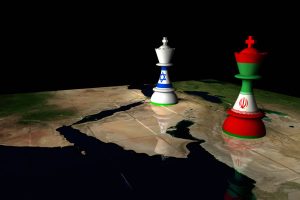It has been said that when German Chancellor Konrad Adenauer signed the reconstitution of the military in 1955, he proclaimed: “It is crazy, gentlemen, that I have to create a German army, it is just crazy”.
Sixty years have passed, but that sentiment still seems very strong in Germany. A few days ago Sigmar Gabriel, the German foreign minister, said: “We have to be a bit careful here that we don’t over-interpret the 2 percent target.” Gabriel then became clearer: “Maintain perspective, stay focused on the target, but avoid being consumed by the bliss of a new rearmament spiral!”
A few days earlier, Germany had made an announcement: to raise the number of soldiers from 170,000 to 198,000 by 2024 — a modest “rearmament”.
It is a direct consequence of the Trump Administration’s important pressure on European allies, urging them to invest more in defense and security. European armies have become, to quote The Economist, “Potemkin Euro-armies“. Germany’s views are crucial to understanding Europe’s attitude about security and defense. Germany, the world’s fourth-largest economy and Europe’s financial giant, is a military dwarf, proud of being weak and disarmed.
Take the countries which suffered most of terror attacks in the last two years. Belgium? It spends 0.85% of its gross domestic product on defense. France? 1.78%. Germany? 1.19%. Spain, which in 2004 experienced the most severe attack in Europe’s recent history? 0.94%.
Europe is enjoying a big siesta. It is disarmed not only militarly but also mentally. Seventy-five percent of Belgium’s military spending goes to pay army pensions. As NATO’s Secretary General Lord Robertson put it, “The problem in Europe is that there are far too many people in uniform, and too few of them able to go into action.”
Another NATO official, Joseph Ralston, the former supreme commander for Europe, defined European armies as “fat and redundant”.
These countries have all embraced the moral vanity of pacifism.
Thanks to it, Germany’s military supply depots are now almost completely empty, according to the newspaper, Die Welt. Possibly fearing a “rearmament spiral”, Germany in fact ended up with a shy army with no drums.
The German population is unwilling to defend itself. A survey by the research firm TNS Emnid showed that 73% of the Germans remain opposed to higher military spending by NATO countries. Manfred Güllner, head of the Berlin-based pollster, Forsa, said that many Germans “would rather have the military not be operational and stay at home”. For most Germans, “history is over“. After the reunification of the country, they seem to mean, they have no more enemies or threats; only friends and opportunities to build a better world, all together. According with Der Spiegel, “Germany is experiencing a relapse into pacifism”.
Born in the years of a Cold War that could become hot, the Bundeswehr, the German army, was the backbone of NATO forces. Today, it is Europe’s military soft underbelly. In contrast to its European neighbors (Belgium, Denmark, France and the Netherlands), Germany refused to deploy its military jets to attack Islamic State positions in Iraq. When, last September, German Defense Minister Ursula von der Leyen visited Iraq to talk to the German officers training Kurdish fighters, she assured her troops that they would not be close to the battle zones. She added that for the German army, “Security is the highest priority”.
John Vinocur wrote in the Wall Street Journal that Germany, one of the largest manufacturers of weapons in the world, has made it clear again that even facing a barbaric enemy, such as ISIS, it is a non-lethal actor. “Diplomats in uniform” is how German soldiers have been called. In Germany, sending fighting troops abroad looks unthinkable today.
The military no longer figures in the German public’s consciousness. If a German chief of staff can be pressured to resign after a raid in Afghanistan did not go as well as planned, it means that he did not have the backing of his society and government.
The German army is now just 20% of what it was in 1990. The country is the economic leader in Europe, but Berlin refuses to invest in security and defense — even less so than the UK, France and other European nations.
Konstantin Richter wrote:
“In the decades since World War II, Germans have turned into genuine pacifists, enjoying their role on the sidelines of global conflicts. A majority of the German public opposes combat missions, and supports the Bundeswehr only as a quasi-humanitarian organization, a kind of Médecins Sans Frontières with guns.”.
In a recent Foreign Policy article, Hans Kundnani found that “a simple comparison between the American and German military budget illustrates the problem”. In 2015, according to the International Institute for Strategic Studies, the U.S. defense budget was $597.5 billion. Germany’s was $36.7 billion, one-twentieth the size of America’s. The same is true for the number of soldiers: Germany army has shrunk to 176,752 active military personnel, a seventh of the 1.3 million of the United States.

Soldiers of the German army on parade in 2009. (Image source: Włodi/Flickr) |
That is why Jochen Bittner of Die Zeit wrote: “For the foreseeable future, don’t count on us Germans”. The late Guido Westerwelle, as Germany’s foreign minister from 2009 to 2013, made the withdrawal of American nuclear weapons from Germany one of his top priorities.
According Kundnani, this military dysfunction reflects a cultural one:
“In the first decade after reunification in 1990, Germany seemed to be converging with France and the U.K. on the question of the use of military force. This incremental shift culminated in Germany’s participation in the Kosovo War in 1999. ‘Never again Auschwitz’ seemed to have replaced ‘never again war’ as a fundamental principle of German foreign policy. But in the 2000s, against the backdrop of the deployment of the Bundeswehr to Afghanistan and the perceived failures of military interventions elsewhere, Germans seemed to revert to the principle of ‘never again war.’ Germany refused to participate in the military intervention in Libya in 2011 — a decision that many Germans feel has been vindicated. And even the strategic shock of the Ukraine crisis hasn’t changed German attitudes about the use of military force.”
“Pacifism became the German lifestyle“. So a few weeks ago, a German MEP expressed his anger after his 16-year-old daughter received a letter from the army in search of volunteers. “It is outrageous that people so young are being targeted”, said Özcan Mutlu to the news website taz.de. “Young people need protection”. And what does a modern Western society need to be protected? Germany and Europe are not able to answer this question. That is why they are all desperate about Trump’s request to invest more in defending themselves, as if they hope to continue their siesta forever.
The relative abundance enjoyed by the Western post-war generations have created a kind of shame instead of pride. Being born in Europe after the Second World War meant belonging to the dregs of humanity, an execrable society that, for centuries, oppressed almost all the rest of the planet. Europe’s commitment for the Third World and the “wretched of earth” is accompanied by a strange fatalism: Why defend the feeble Western democracies, since the path of history requires their disappearance? We are supposedly at “the end of history”. That is the moral arrogance pervading the Europeans today: at the time of twilight, we just have to work to our own downfall. That is the mentality through which “pacifism, sometimes in a self-righteous manner, has become part of the German DNA”.
What did Spain do after al-Qaeda bombed Madrid’s trains? It withdrew its army from Iraq. What did France do after the carnage at the Bataclan Theater? It played John Lennon’s “Imagine”. What did Belgium do after the bombings in Brussels? It lit candles. What Germany did after the massacre at the Christmas market in Berlin? It cried, “Je suis Berlin”. There is something so tragic and despairing in the Germany’s lack of will to hunt down and eradicate the Islamic State.
See Germany, which destroyed Europe with its arms race under the Nazis. It is now putting Europe at risk again — but this time out of the fear of a supposed “rearmament spiral”. It is as if they think that just because you do not have an army, this means there can be no fight. But there is good news: the US Marines have just arrived in Syria to fight the Islamic State!
Giulio Meotti, Cultural Editor for Il Foglio, is an Italian journalist and author.




























